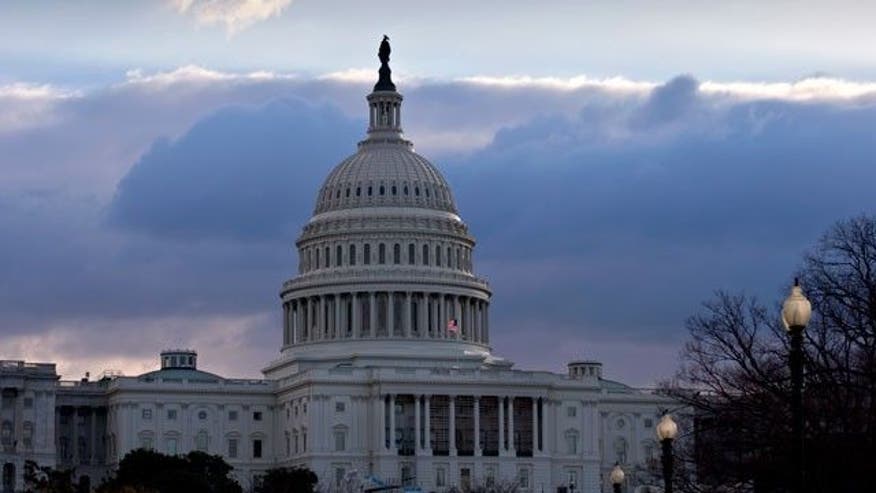Published October 12, 2013 FoxNews.com

Negotiations to fully reopen the federal government and increase the debt limit faltered Saturday in the Senate and House – with a proposal by a moderate Senate Republican being rejected, hence postponing any hopes of breakthrough until at least Tuesday-- two weeks after the partial shutdown started.
The plan by Maine GOP Sen. Susan Collins to fund the government for six months and increase the federal debt limit through January was rejected by leaders of the Democrat-led Senate, who purportedly though they were not getting enough in exchange.
The upper chamber also failed the get the necessary 60 vote on a bill to increase the debt through 2014 that was “clean” of Republican demands to spending cuts or changes to ObamaCare.
In the Republican-controlled House, negotiations ended abruptly when Republicans refused to let Democrats vote on a bill to reopen the government, which resulted in an exchange between a staffer from each party.
“They amended the rules so only Majority Leader Eric Cantor can put something on the floor to open the government,” said Maryland Democratic Rep. Steny Hoyer, the House minority whip.
Earlier in the day, House Speaker John Boehner told his caucus in a closed door meeting that he and president still have no deal.
"The Senate needs to hold tough," Rep. Greg Walden, R-Ore., said Boehner told House GOP lawmakers. "The president now isn't negotiating with us."
The Collins plan -- which has bipartisan support -- calls for a two-year delay on ObamaCare's medical device tax and requires income verification for Americans seeking subsidies for ObamaCare.
Democrats purportedly rejected the deal because the spending level of $967 billion next year was too low, despite it providing more flexibility in administering the federal budget cuts under sequester.
The partial government shutdown kicked in Oct. 1, after lawmaker failed to reach a temporary spending bill. And the federal government is projected to default on its debt Thursday unless Congress increases the federal government’s borrowing limit.
Still, Senate Majority Leader Harry Reid and Minority Leader Mitch McConnell appear to be keeping an open dialogue.
"The only thing that's happening right now is Sen. Reid and Sen. McConnell are talking. And I view that as progress," said the second-ranking Republican senator, John Cornyn of Texas.
The Associated Press contributed to this report.


Negotiations to fully reopen the federal government and increase the debt limit faltered Saturday in the Senate and House – with a proposal by a moderate Senate Republican being rejected, hence postponing any hopes of breakthrough until at least Tuesday-- two weeks after the partial shutdown started.
The plan by Maine GOP Sen. Susan Collins to fund the government for six months and increase the federal debt limit through January was rejected by leaders of the Democrat-led Senate, who purportedly though they were not getting enough in exchange.
The upper chamber also failed the get the necessary 60 vote on a bill to increase the debt through 2014 that was “clean” of Republican demands to spending cuts or changes to ObamaCare.
In the Republican-controlled House, negotiations ended abruptly when Republicans refused to let Democrats vote on a bill to reopen the government, which resulted in an exchange between a staffer from each party.
“They amended the rules so only Majority Leader Eric Cantor can put something on the floor to open the government,” said Maryland Democratic Rep. Steny Hoyer, the House minority whip.
Earlier in the day, House Speaker John Boehner told his caucus in a closed door meeting that he and president still have no deal.
"The Senate needs to hold tough," Rep. Greg Walden, R-Ore., said Boehner told House GOP lawmakers. "The president now isn't negotiating with us."
The Collins plan -- which has bipartisan support -- calls for a two-year delay on ObamaCare's medical device tax and requires income verification for Americans seeking subsidies for ObamaCare.
Democrats purportedly rejected the deal because the spending level of $967 billion next year was too low, despite it providing more flexibility in administering the federal budget cuts under sequester.
The partial government shutdown kicked in Oct. 1, after lawmaker failed to reach a temporary spending bill. And the federal government is projected to default on its debt Thursday unless Congress increases the federal government’s borrowing limit.
Still, Senate Majority Leader Harry Reid and Minority Leader Mitch McConnell appear to be keeping an open dialogue.
"The only thing that's happening right now is Sen. Reid and Sen. McConnell are talking. And I view that as progress," said the second-ranking Republican senator, John Cornyn of Texas.
The Associated Press contributed to this report.
